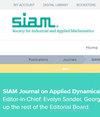Sufficient Conditions for Linear Stability of Complex-Balanced Equilibria in Generalized Mass-Action Systems
IF 1.8
4区 数学
Q2 MATHEMATICS, APPLIED
引用次数: 0
Abstract
SIAM Journal on Applied Dynamical Systems, Volume 23, Issue 1, Page 325-357, March 2024.Abstract. Generalized mass-action systems are power-law dynamical systems arising from chemical reaction networks. Essentially, every nonnegative ODE model used in chemistry and biology (for example, in ecology and epidemiology) and even in economics and engineering can be written in this form. Previous results have focused on existence and uniqueness of special steady states (complex-balanced equilibria) for all rate constants, thereby ruling out multiple (special) steady states. Recently, necessary conditions for linear stability have been obtained. In this work, we provide sufficient conditions for the linear stability of complex-balanced equilibria for all rate constants (and also for the nonexistence of other steady states). In particular, via sign vector conditions (on the stoichiometric coefficients and kinetic orders), we guarantee that the Jacobian matrix is a [math]-matrix. Technically, we use a new decomposition of the graph Laplacian which allows us to consider orders of (generalized) monomials. Alternatively, we use cycle decomposition which allows a linear parametrization of all Jacobian matrices. In any case, we guarantee stability without explicit computation of steady states. We illustrate our results in examples from chemistry and biology: generalized Lotka–Volterra systems and SIR models, a two-component signaling system, and an enzymatic futile cycle.
广义质量作用系统中复杂平衡平衡点线性稳定性的充分条件
SIAM 应用动力系统期刊》第 23 卷第 1 期第 325-357 页,2024 年 3 月。 摘要广义质量作用系统是化学反应网络中产生的幂律动力系统。基本上,化学和生物学(如生态学和流行病学),甚至经济学和工程学中使用的所有非负 ODE 模型都可以用这种形式写成。以往的研究成果主要关注所有速率常数的特殊稳态(复平衡平衡)的存在性和唯一性,从而排除了多重(特殊)稳态。最近,我们获得了线性稳定性的必要条件。在这项工作中,我们为所有速率常数下的复平衡平衡线性稳定性(以及其他稳态的不存在)提供了充分条件。特别是,通过符号矢量条件(关于计量系数和动力学阶数),我们保证了雅各布矩阵是一个[math]矩阵。在技术上,我们使用了一种新的图拉普拉斯分解法,它允许我们考虑(广义)单项式的阶数。或者,我们使用循环分解,它允许对所有雅各布矩阵进行线性参数化。无论如何,我们都能保证稳定性,而无需明确计算稳定状态。我们用化学和生物学的例子来说明我们的结果:广义洛特卡-伏特拉系统和 SIR 模型、双成分信号系统和酶徒劳循环。
本文章由计算机程序翻译,如有差异,请以英文原文为准。
求助全文
约1分钟内获得全文
求助全文
来源期刊

SIAM Journal on Applied Dynamical Systems
物理-物理:数学物理
CiteScore
3.60
自引率
4.80%
发文量
74
审稿时长
6 months
期刊介绍:
SIAM Journal on Applied Dynamical Systems (SIADS) publishes research articles on the mathematical analysis and modeling of dynamical systems and its application to the physical, engineering, life, and social sciences. SIADS is published in electronic format only.
 求助内容:
求助内容: 应助结果提醒方式:
应助结果提醒方式:


